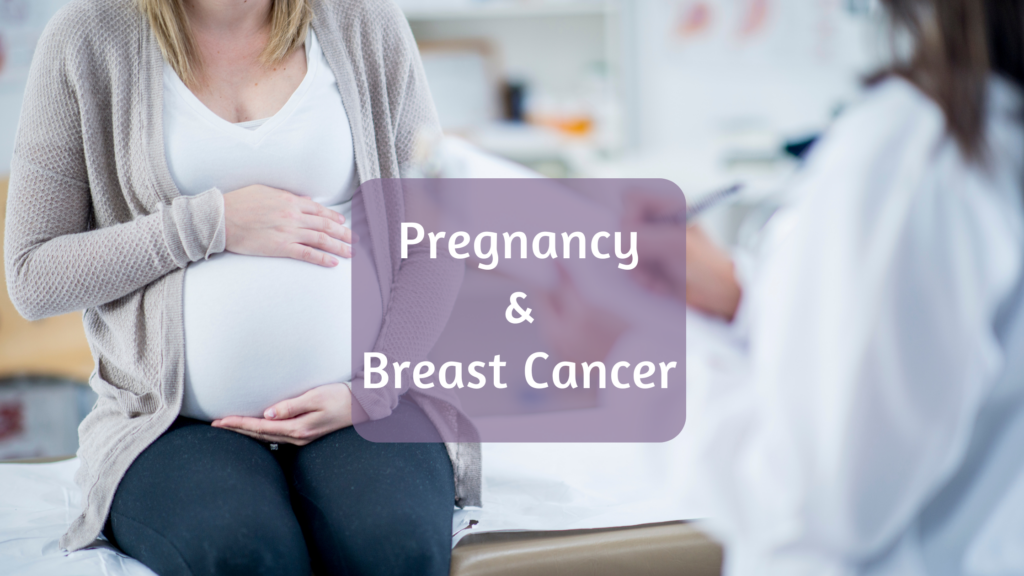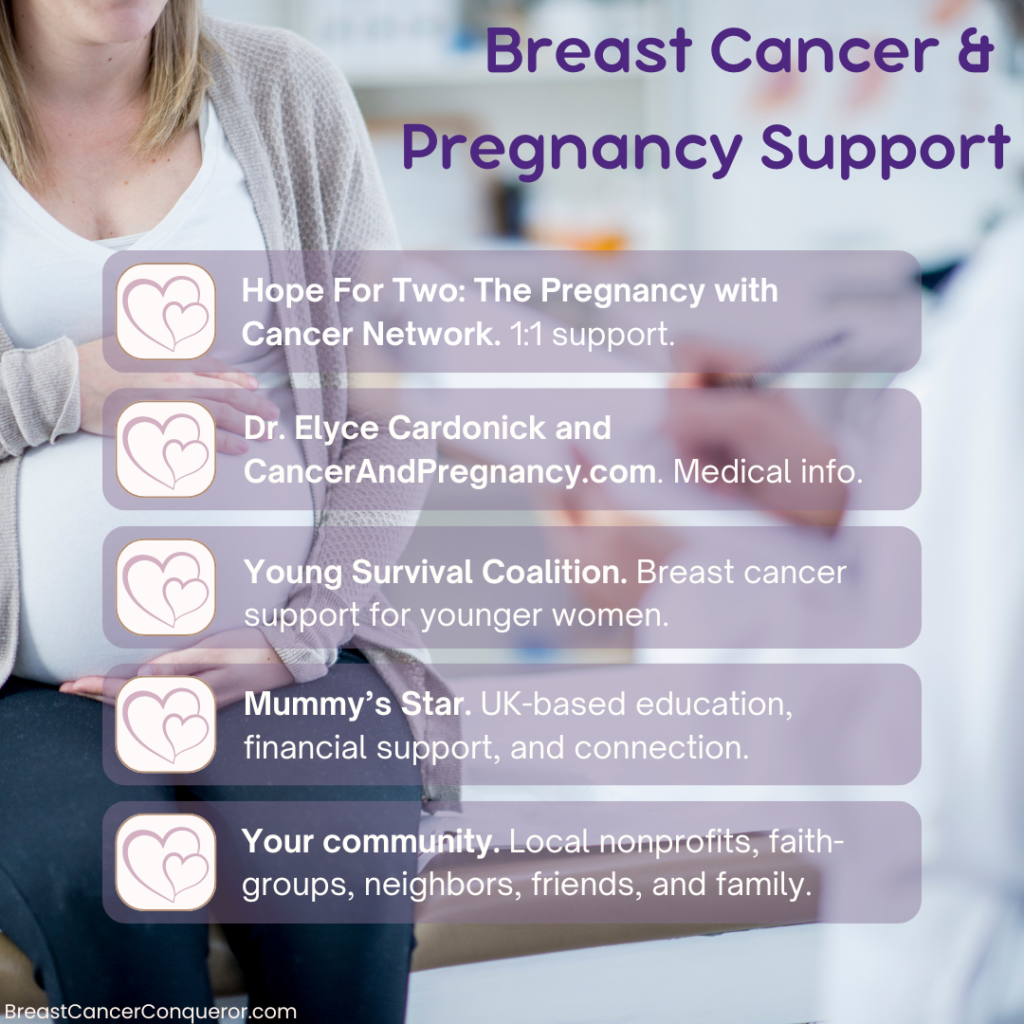

Breast cancer and pregnancy. Those are three words that no one ever even thinks about to hear together. Pregnancy alone can be an arduous and traumatizing experience…and now cancer is in the same body as your future baby. Your pregnancy is definitely not what you imagined it would be.
First, I want to give you a big heart hug and tell you there actually is HOPE. You are not alone, and you can have a healthy baby and heal the cancer. There are so many options available, and highly trained people want to support each moment of your journey.
Your healing voyage and treatment protocols can also be tailored to your body’s needs throughout each trimester and postpartum. As such, you don’t have to stay with your same OBGYN or go with the first oncologist you meet. Research and ask questions. And then ask some more. This blog will help you note some of the things you should consider and supply caring organizations that were born to support your mind and soul.

Breast Cancer and Pregnancy
Although being diagnosed with breast cancer during pregnancy is rare, it does affect about 1 in every 3,000 pregnancies and mostly occurs in women ages 32-38 years old. Diagnosing a tumor may also take longer since common breast cancer and pregnancy symptoms are often the same: breast swelling and tenderness, exhaustion, nausea, and just feeling off. Sadly, when a pregnant woman mentions the above symptoms to her friends or even doctor, she’s often told, oh, that is just part of pregnancy. Instead of: “I hear you; let’s figure out the root cause of what is making you feel so miserable.”
These hormonal changes can also cause breast cancer tumors to grow faster, making them larger and more advanced before officially being diagnosed as breast cancer. Detecting small lumps can be more challenging because pregnancy can naturally cause breasts to become denser, larger, lumpy, and tender.
All this to say, you need to know the facts—including this steadfast, hopeful one: “In general, studies show that pregnant women who develop breast cancer do not have a worse survival rate compared to nonpregnant women. This similar survival rate depends upon the adequate and timely treatment for a pregnant woman’s cancer and may include treatment during the pregnancy.” The data from an international collaborative study can be found here. Additionally, there has never been a case of breast cancer spreading from the mother to the fetus.
Questions to ask your care team.
You may have a million questions, concerns, worries, and endless emotions. Let them all out with your care team and with the support organizations mentioned below. It may also be worth looking into comprehensive care facilities that specialize in breast cancer during pregnancy. There are many around the country, and one that comes to mind is the Dana-Farber Brigham Cancer Center’s Susan F. Smith Center for Women’s Cancers Breast Oncology Program (website).
No matter where you start, here are a few questions to consider asking and researching:
- What is the chance my cancer will advance if I delay the treatment until after birth? Will this impact my baby at all?
- Are there natural therapies, supplements, foods, and other treatments that are safe for my baby, and can I start immediately?
- What are my treatment options for my trimester and stage of cancer? Are different treatments and protocols recommended for each trimester and postpartum?
- What are the risks and benefits of treating cancer during pregnancy?
- Can I breastfeed my baby?
- Can you recommend a genetic counselor?
- Can I get pregnant after breast cancer? Should I If so, how long should I wait, and is there anything I should do to prepare my body?
- Do you suggest any support groups?
Breast Cancer and Pregnancy Support Groups and Organizations
Again, you are not alone. Seeking emotional support and connection during this journey is essential, and I can’t recommend it enough. There are women all over the world who have also felt the shock of a horrific diagnosis, cried endless tears, experienced crippling anxiety, and know exactly what you may silently be struggling with. They want to help. Reach out and lean on them. The power of women supporting women is one of the greatest forces in our world.
Hope for Two: The Pregnant with Cancer Network
hopefortwo.org: “An international nonprofit organization for women diagnosed with cancer during pregnancy. Our mission is to connect women who are pregnant with cancer with other women who have been pregnant with the same type of cancer. These women are here to lend support, offer hope, and share their experiences with one another through phone and e-mail conversation.”
Hope For Two is affiliated with the current national expert on pregnancy and cancer, Dr. Elyce Cardonick. She is available to answer medical questions and can be reached at 877-635-4499. You can also learn more about her research via cancerandpregnancy.com.
Mummy’s Star
mummysstar.org is a UK and Ireland nonprofit that offers support to women who are diagnosed with cancer in or around pregnancy. They can connect you to women in similar situations, provide financial help, and offer education about cancer and pregnancy.
Young Survival Coalition
youngsurvival.org “Young Survival Coalition (YSC) strengthens the community, addresses the unique needs, amplifies the voice and improves the quality of life of young adults affected by breast cancer, locally, nationally and internationally.” Since most women who are diagnosed with pregnancy are in their 30s, YSC can provide support focused on things unique to a younger demographic, such as fertility issues and the ramifications of early menopause.
Reach out to your community
On top of emotional support, you may need help with meals, watching the new baby and older kids, doing laundry, and the list goes on. Financial support could also be extremely helpful during this challenging time. Luckily, countless nonprofits, community organizations, and faith-based groups genuinely want to support you. Your friends, family, and neighbors feel the same way. Never feel bad about reaching out and asking for help. Humans are designed to support, care for, and love each other. People will be honored to help out in any way they can. Give them a chance.
Breastfeeding With Breast Cancer Myths
Breastfeeding has many benefits for both the mom and baby and in many cases, it can be safe during cancer treatments. However, please thoroughly discuss breastfeeding options with your medical team, as every mom’s situation is different.
Below are a few breastfeeding myths and misconceptions to know to make the best decision possible. This information comes from the specialists at the Janet Knowles Breast Cancer Center at MD Anderson Cancer Center at Cooper. Please review this article for more information.
- Myth: Babies will refuse to feed from a cancerous breast. Fact: Babies tend to only refuse to nurse from a breast with cancer if the taste of the milk changes or the growth of the cancer decreases the mother’s milk supply.

- Myth: Anesthesia may transfer into the milk. Fact: The body metabolizes anesthesia medications quickly, so it is safe for a mother to nurse her baby once the anesthesia medications wear off.
- Myth: Needle aspiration affects milk production. Fact: This procedure involves removing fluid only from cysts and other growths and has no impact on a mother’s production of milk.
- Myth: Diagnostic imaging techniques affect milk production. Fact: Diagnostic imaging is non-invasive and does not impact how much milk a mother produces. It is not dangerous to breastfeed your child after any of these procedures, but you should pump or feed your baby just before your imaging studies to empty the breast and make it easier to detect any abnormalities.
You do have hope—and lots of it. Please lean on organizations like hopefortwo.org and your friends, family, and community. As the old saying goes, “It takes a village to raise a child.” And it also takes a village to raise a mom, especially a Breast Cancer Conqueror.
Disclaimer: This blog is designed to provide general information and emotional support for those who find out they have breast cancer while pregnant. Please do not try anything new without speaking to your medical team.
Author: Dr. Veronique Desaulniers, better known as Dr. V, is a Doctor of Chiropractic & has 44 years of experience in the wellness industry. For personalized support, please partner with a trained Breast Cancer Conqueror Coach.